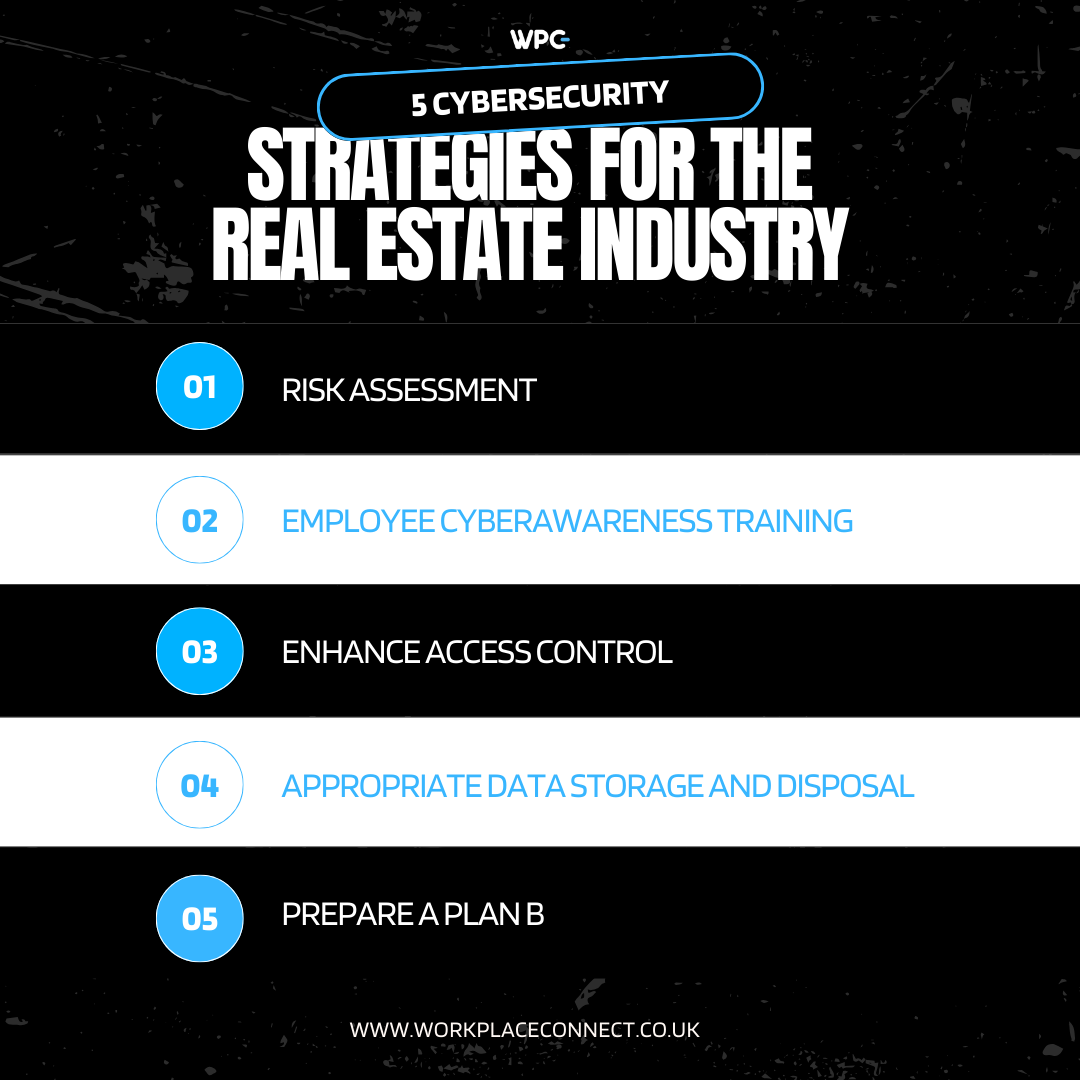Cybersecurity breaches pose a serious risk to any organisation, but real estate agents are particularly vulnerable. Realtors acquire sensitive consumer information such as finances, Social Security numbers, and contact information, which data thieves would love to get access to. A massive data breach has the potential to bankrupt a corporation. According to an IBM analysis from 2022, the usual cost of data leaks is £3.59 million.
Strict cybersecurity precautions are an essential component of real estate company activities. Realtors must protect themselves from cybersecurity threats and develop robust data security protocols. Here are the risks associated with cybersecurity that realtors must guard against, as well as how to adopt thorough data security policies.
Why are real estate agents a target for cybercriminals?
Real estate firms not only retain the data that hackers seek, but they also use digital payment systems, collaboration tools, and “property tech” services that expose them to intrusions. Furthermore, many realtors work out of small offices that do not have the resources to implement an advanced cybersecurity suite.
Hackers are particularly drawn to real estate businesses because they keep customer information, which realtors must deal with on a daily basis. It only takes a single successful phishing attack or a negligent realtor to provide cybercriminals with access to bank account information or mortgage documents.
To prevent these dangers, real estate professionals use cybersecurity solutions and stringent standards. Proactively safeguarding online information can help protect against information theft and maintain client trust.
Dear Real Estate Industry, watch out for these..
Phishing: One type of prevalent cyberattack is when hackers employ social engineering techniques to deceive people into disclosing sensitive information. Phishing is a type of social engineering that involves claiming to be a trustworthy firm in order to obtain sensitive information.
Although spelling problems, poor grammar, and strange syntax make it easy to notice scam efforts, sophisticated fake emails can be difficult to identify. Hackers, for example, may create emails that are nearly identical to messages from a trustworthy brand.
To avoid falling victim to a phishing scam, use caution while opening emails and clicking on links.
Ransomware: A ransomware attack occurs when hackers use software to attack a system and demand ransom in exchange for stopping their activity and releasing any stolen information. Small businesses are especially susceptible to this type of cyber attack since their defences are likely to be weaker, and a breach of data of this magnitude might interrupt corporate operations.
Human error: Unsurprisingly, the majority of cybersecurity breaches are caused by human mistake. According to Verizon’s 2022 Data Breach Investigations Report, human reasons like as stolen passwords, phishing scams, and workers failing to comply to established organisational cybersecurity policies caused 82% of data breaches.
Five cybersecurity strategies for the real estate industry
Because real estate activities are becoming increasingly digital, cybersecurity is more vital than ever. The steps below provide an effective methodology for anticipating and responding to cyber threats:
- Risk assessment: Examine the company’s cybersecurity infrastructure for any security flaws. Use this information to develop a long-term cybersecurity strategy that is inexpensive, efficient, and successful for your company’s data security needs. Implement particular protocols for monitoring potential harmful activity and exposure to risks, especially if the organisation works with third-party vendors who have access to sensitive data.
- Employee training: Include cybersecurity training and onboarding with company training and onboarding. Ensure that personnel is adequately informed on detecting phishing and ransomware assaults and that training programmes are updated as thieves change their tactics. Frequent phishing tests are a great method to see if employees are following protocol. Also, warn employees not to overshare on social media, especially when it comes to business projects or that might reveal customer information.
- Enhance access control: Hackers use cybersecurity flaws to get access to accounts and information. Protect yourself against this by using stringent security measures along with uniform internal user access regulations. Employees, for example, must only use their business email for work-related activities and must enable the use of multi-factor authentication for remote workers. Ensure that your organisation’s email encryption and anti-malware tools are always up to date and that both your professional and personal mobile apps aren’t collecting and exchanging sensitive data.
- Appropriate data storage and disposal: Along with typical electronic security measures such as email encryption and firewalls, real estate cybersecurity standards should be supplemented with frequent computer security tests, two-factor authentication, password managers, and vulnerability assessments. Follow established FTC requirements for customer data disposal to ensure that personal information is not accessed, read, or reconstructed after erasure.
- Prepare a Plan B: Anticipate the best but brace yourself for the worst. Ascertain that the security team has a strategy in place to deal with any data breaches that may occur. Compile paperwork explaining the company’s proposed post-breach action plan, including client notice and public statement templates. It is important to keep in mind that there are both state and federal legal standards for data breach notifications; to ensure that the organisation complies.
Secure Your Success
The never-ending digitisation of our workers and professions brings with it almost as many risks as benefits, including the possibility of data leaks. Cybersecurity breaches can result in irrevocable monetary damages and a ruined reputation, therefore real estate companies must devote time and resources to developing a thorough cybersecurity strategy. Following implementation, real estate companies should analyse and upgrade their security measures on a regular basis to keep up with the constantly evolving cyber threat scenario.
By prioritising data security, realtors can develop trust with customers and protect their private data, which will eventually contribute to a more profitable and long-lasting business. Workplace Connect specialises in helping landlords and real estate tenants with their connectivity and security needs. Contact us today!







